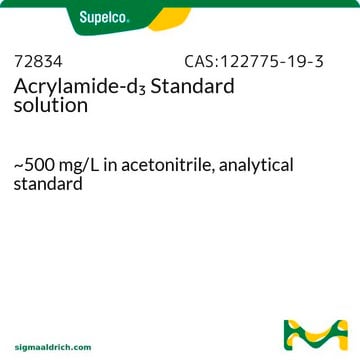01700
Acrylamide
purum, ≥98.0% (GC)
Synonyme(s) :
2-Propenamide, Polyacrylamide, acrylic amide, akrylamid, Acrylic acid amide
About This Item
Produits recommandés
Densité de vapeur
2.45 (vs air)
Niveau de qualité
Pression de vapeur
0.03 mmHg ( 40 °C)
Qualité
purum
Pureté
≥98.0% (GC)
Point d'ébullition
125 °C/25 mmHg (lit.)
Pf
81-87 °C
82-86 °C (lit.)
Solubilité
water: soluble 200 g/L at 20 °C
Température de stockage
room temp
Chaîne SMILES
NC(=O)C=C
InChI
1S/C3H5NO/c1-2-3(4)5/h2H,1H2,(H2,4,5)
Clé InChI
HRPVXLWXLXDGHG-UHFFFAOYSA-N
Vous recherchez des produits similaires ? Visite Guide de comparaison des produits
Application
Actions biochimiques/physiologiques
Mention d'avertissement
Danger
Mentions de danger
Classification des risques
Acute Tox. 3 Oral - Acute Tox. 4 Dermal - Acute Tox. 4 Inhalation - Carc. 1B - Eye Irrit. 2 - Muta. 1B - Repr. 2 - Skin Irrit. 2 - Skin Sens. 1 - STOT RE 1 Oral
Organes cibles
Peripheral nervous system
Code de la classe de stockage
6.1C - Combustible acute toxic Cat.3 / toxic compounds or compounds which causing chronic effects
Classe de danger pour l'eau (WGK)
WGK 3
Point d'éclair (°F)
280.4 °F - closed cup
Point d'éclair (°C)
138 °C - closed cup
Équipement de protection individuelle
Eyeshields, Faceshields, Gloves, type P3 (EN 143) respirator cartridges
Faites votre choix parmi les versions les plus récentes :
Déjà en possession de ce produit ?
Retrouvez la documentation relative aux produits que vous avez récemment achetés dans la Bibliothèque de documents.
Les clients ont également consulté
Notre équipe de scientifiques dispose d'une expérience dans tous les secteurs de la recherche, notamment en sciences de la vie, science des matériaux, synthèse chimique, chromatographie, analyse et dans de nombreux autres domaines..
Contacter notre Service technique






